- Home
- David Downing
Silesian Station (2008) Page 7
Silesian Station (2008) Read online
Page 7
There was an obvious couple in the waiting room, Jews by the look of them, in their mid to late thirties. Russell wished them good morning and sat down in what proved a surprisingly comfortable chair.
'You are here for a visa?' the man asked.
'Yes,' Russell said, surprised by the directness of the question. 'I'm a journalist,' he added, 'an American journalist.'
'You are not German?'
'No, but I've lived here for many years.'
Silence followed, as if the two Jews were trying to work out why anyone foreign would choose to live in Germany. They were middle-class Jews, Russell noticed. The young man's clothes showed signs of serious wear and repair, but they would have been expensive when he bought them.
'Do you know anything about the situation in Shanghai?' the woman asked him suddenly.
'Not really. A lot of German Jews have emigrated there over the last six months. I believe the Gestapo chartered several ships.'
'They did. My cousins went on one, but we have heard nothing since.'
'That doesn't mean anything,' her husband interjected. 'You know what the post is like here - imagine what's it like in an occupied country like China.' He turned to Russell. 'We are here for transit visas,' he explained.
'I still think...' his wife began, but saw no point in completing the thought out loud. 'But what are they all doing in Shanghai?' she asked her husband. 'What will we do?'
'Survive,' he said tersely.
'So you say. We could survive in Palestine.'
Her husband made a disparaging noise. 'Palestine is just a big farm. Shanghai is a city. And if we don't like it we can go on to Australia or America.'
'With what?'
'We shall earn. We always have. Until Hitler came along and said we couldn't.'
'That's all very...' She stopped as footsteps sounded in the hall.
The grey suit appeared in the doorway, a newly-lit cigarette in one hand. 'Joseph and Anna Handler? This way.'
Russell was left to examine his surroundings. The Embassy seemed remarkably silent, as if most of the staff were off on holiday. Or off on a purge. The waiting room contained framed portraits of both Lenin and Stalin, gazing severely at each other from opposite walls. He thought through what he intended to say one more time, and hoped he wasn't guilty of over-confidence. He had got away with playing both ends against the middle in March, but he knew he'd been lucky as well as clever. The penalties for failure would be even worse this time, because Effi would also have to pay them. He might be shot as a spy, might escape with deportation. She would go to Ravensbruck.
The smoker returned about fifteen minutes later, and led Russell down a corridor to an office overlooking the central courtyard. A youngish woman with short curly hair and glasses sat behind the only desk, filing her finger-nails. After a minute or so she held them up to the window, examined them from every conceivable angle, and lowered them again.
'Do you speak Russian?' she asked Russell in that language.
'Only a little.'
'English?'
'I am American.'
'Yes I see.' She picked up the passport.
'I am not here for a visa,' Russell said. 'I need to see your highest-ranking intelligence officer - NKVD or GRU, it doesn't matter.'
She just looked at him.
'I am a friend of the Soviet Union,' Russell said, exaggerating somewhat. 'I'm here to offer my services.'
'Wait there,' she said, taking his passport and press credentials and leaving the room. She was wearing bright red carpet slippers, Russell noticed.
A few seconds later the smoker took up position in the doorway. Russell's smile elicited nothing more than a faint curl of the lip. It seemed distressingly likely that the object distorting his suit pocket was a gun.
Several minutes went by before the woman returned. A single sentence of Russian to the smoker, and he gestured Russell to follow. They climbed a wide marble staircase lined with poster-size photographs of factories and dams, and walked around the balustraded gallery. The furthest door led into a spacious office, high-ceilinged with a huge glass chandelier and two tall windows over-looking the Unter den Linden. A man in a dark grey suit, round-faced and balding, stood waiting in the middle of the room.
'Mr Russell? Please take a seat. We can speak in English, yes?' He chose an armchair for himself. 'Thank you, Sasha,' he said to the smoker, who left, closing the door behind him. 'So, you offer us your services?'
'And not for the first time,' Russell said.
'No? Please tell me. I know nothing of you.'
'May I know your name?'
'Konstantin Gorodnikov. I am trade attache here at the embassy. With other responsibilities, of course.'
After sketching in his communist past, Russell told the Russian about the series of articles he had written for Pravda earlier that year, and the oral reports on conditions in Germany that had accompanied them. 'My initial contact was Yevgeny Shchepkin - he never told me which service he worked for - but someone took his place at our third meeting, a woman named Irina Borskaya...'
'Wait a moment,' Gorodnikov said. He walked over to his desk, took a sheet of paper from the pile beside the typewriter, and selected a pen from those in the tray. A quick search for something to rest the paper on turned up a dog-eared copy of a popular German film magazine. Fully equipped, the Russian reoccupied his chair. 'Please continue.'
Russell did so. 'Comrade Borskaya never told me exactly who she worked for, either. She asked me to bring some documents out of Germany, and I agreed to do so on condition that her people helped a friend of mine across the border into Czechoslovakia. We both kept our parts of the bargain, but then she asked me to do something else. And when I refused, she planted some incriminating papers on me and tipped off the Gestapo.
'All this happened earlier this year. The Germans were not sure that I'd actually done anything illegal, but they knew I'd been in contact with your people over the articles and they suspected that there was more. Then, while I was in America this month, they arrested my girlfriend Effi for telling a bad joke about Hitler. When I got back last Monday the SD gave me a choice - work for them or Effi would be sent to a concentration camp. When I asked what they wanted me to do, they said I was to reestablish contact with you people and offer you intelligence. The idea being, of course, that they would be giving me false intelligence to pass on. So here I am. Obviously I have no desire to help the Nazis, or I wouldn't be telling you all this.'
Gorodnikov had written copious notes throughout this exposition, only pausing to sweep an imaginary speck of dust from his trousers when Russell mentioned Borskaya's attempted betrayal. 'That is very crystal clear,' he said, once it was plain the other had finished. 'You have skill for organising information.'
'That's my job,' Russell said dryly.
'Yes, I think so. And crystal clear means little without truth. I have no way to know how true this story is, here, now, but there can be later checking - I think you know that. So, let us say your story is true.'
'It is.'
'So. First question. If our person tries to have Gestapo arrest you, I think you will be very angry with Soviets. So why you want to help us? Why not just do what Gestapo want, and then you and your lady friend will be safe?'
'As I said, I don't like them. That's the first thing. I'm not crazy about you lot either, but if I'm forced to make a choice then there's no real contest. The Soviet Union might turn into something good - miracles can happen. Nazi Germany is something else. Nothing good grows out of scum. Do you understand?'
'You are anti-Nazi. That is good, but not surprise. Many people are anti-Nazi. Many Germans.'
'True, but they're not all being asked to help the bastards.'
Gorodnikov smiled for the first time.
'And they're not all willing to work for you,' Russell went on.
'How you work for us?'
'Well, I'll be bringing you false information that you know is false. Someone should be ab
le to work something out from that.'
'Yes, but...'
'Look, I don't want any misunderstandings here. I'm not saying that I'm willing to die for the Soviet Union. Or anyone else for that matter. I'm willing to take some risks, but not those sort of risks. I won't take any more secrets across borders for you, but I'm ready to do some courier work inside Germany. And I'll pass on all the useful information which I come across as a journalist - I have good contacts here, and in London.'
'And you'll do this because the Nazis are scum?'
'And for one other thing.'
'Ah.'
'I want an escape route for myself and my girlfriend. I want you and your people to guarantee us a way out of Germany if we need one. I don't think that's unreasonable - I mean, it must make sense for you to keep your people out of the bastards' clutches. I know you can do it, and after the trick Com-rade Borskaya tried to play on me I think you owe me that much.'
'Mm.' Gorodnikov scribbled another couple of lines. 'All right, Mister Russell. I will send this information to Moscow. They will decide.'
'How long?' Russell asked, hoping the Russian would say a couple of months.
'Oh not long. One week. Two maybe. Say you come again next Friday. Yes?'
'Right,' Russell agreed without enthusiasm. The Americans, the Germans, and now the Russians. Thank God the British had given up on him.
The embassy door closed swiftly behind him, as if pleased to be rid of his presence. It wasn't personal, Russell guessed. Just that sense of carefree bonhomie which Soviet establishments exuded the world over.
He walked up to Friedrichstrasse, had another coffee at the Cafe Kranzler, and telephoned the number Hauptsturmfuhrer Hirth had given him. The voice at the other end recognized Russell's name, which was hardly surprising but disconcerting nevertheless. He gave a brief run-down of his first meeting at the Soviet Embassy, and listened as the message was laboriously repeated back to him.
'That is all,' the voice said, as if expecting applause.
If only it was, Russell thought.
He walked back down Unter den Linden to the car, retrieved the Berlin street map from the glove compartment and spread it across the wheel. His next port of call, he discovered, was out beyond Friedrichshain.
His route took him past the end of the street in which the Wiesners had ended their Berlin days. There were more than a few obviously Jewish faces to be seen, but fewer stalls selling furniture and knick-knacks than there had been six months ago. Perhaps they had all been sold. Perhaps some new regulation forbade it.
He eventually reached the address he'd been given - a boarding house in a quiet cul-de-sac that had seen better days. The landlady, a thin middle-aged woman with a young woman's hairstyle, looked Russell up and down, and apparently decided that he was worthy of assistance.
The Isendahls were gone, she said. At the end of May, as far as she could remember. And yes, Freya had received letters from America. She had always given the stamps to the boy next door who collected them. Her husband had said they would send her a forwarding address, but they hadn't. And to be perfectly honest she'd been glad to see the back of them. They were always having friends round, lots of them, and no, they weren't noisy, but there was something about them...
'Were they Jews?' Russell asked innocently.
'Certainly not. That's not allowed, is it? It certainly shouldn't be.'
'Of course not,' Russell agreed. Clearly the woman had no idea that Wilhelm Isendahl was Jewish. 'What did her husband look like?' he asked.
'Oh, nice looking. Blond hair, tall, very charming when he wants to be.'
Russell gave the woman a card with his telephone number. 'If they do send a forwarding address, could you ring me? I'll reimburse any expenses, of course.'
He drove back into the city, wondering whether he should carry on looking. The friends might be innocent, but they seemed more likely to be comrades, and he had no desire to open doors that were best left shut. He would think about it. Maybe ask Kuzorra's advice.
After lunching at Wertheim he rang Effi from the bank of booths by the Leipziger Strasse exit. There was no answer. A quick stop-over at the Adlon offered reassurance that no major news was breaking - the sundry journalists gathered at the bar were wondering how they could wheedle invitations to one of Goering's hunting extravaganzas.
Back on Leipziger Strasse he collected the last available dress suit in his size from Lehmann Dress Hire. On the last occasion he'd used this particular shop it had been trading under the name Finkelstein.
He tried Effi again when he got back to Neuenburger Strasse, but there was still no answer. He told himself not to worry - she had said she was going shopping, after all. She might still be with Zarah. And he couldn't afford to spend his days wondering what she was up to and worrying whether she was all right. That wasn't who they were.
There was still no sign of Frau Heidegger's sister, but she had stirred herself sufficiently to attach an official notice to the inside of the front door. A city-wide Air Raid Protection exercise was being held on the following Wednesday, and all citizens were obliged to cooperate fully with the relevant authorities. Reading through the small print Russell discovered that a complete black-out would be in operation. Selected buildings would be 'bombed', the resulting 'victims' removed by medical teams.
Where to, Russell wondered. Imaginary hospitals? It might make a good story, though. Frau Heidegger would be in her element.
He collected Effi's presents from upstairs and drove across town to her flat. He half-expected that she'd still be out, but they arrived together, she in a cab full of her purchases. Helping her carry these up, he forgot his own pile of parcels. She looked exhausted, but barely a minute had passed when she sprung back up from the sofa and insisted on their walking down to the Ku'damm for dinner. Russell had a brief memory of himself more than twenty years earlier. On his two home leaves from the trenches he had been utterly unable to sit still.
Over dinner she described her day in fearsome detail - the morning with Zarah, lunch with a make-up artist friend who was also working on More Than Brothers, a shopping spree in the Ka-De-We on Tauenzien-Strasse. She'd even managed a session with the street astrologer she consulted every month or so.
'She told me the next few weeks were a good time for grasping opportunities,' Effi told him. "Aren't they all?" I asked her. "Some more than others," she said. I paid three marks for that.'
Russell shook his head. He was never sure how seriously Effi took her astrological adviser.
Back at the flat he remembered her presents, and went to collect them from the car. She loved them all - the soft leather driving gloves from Macy's, the Billie Holiday records which he'd half-expected customs would confiscate, the French perfume she'd originally discovered on their second trip to Paris, the deep crimson dress from Bergdorf Goodman. The latter looked every bit as good on her as Russell had imagined it would.
'I'll wear it tomorrow,' she said, thanking him with a kiss.
Friday evening's premiere was at the Universum, the modernist cinema half-way up the Ku'damm. The stars of the film, along with their escorts, were supposed to arrive between six forty-five and seven, the stars of the Party in the following fifteen minutes. 'This is one time we can't afford to be late,' Effi told Russell the next morning. 'So please be back here by five.'
Getting a lecture from Effi on punctuality was like taking dietary advice from Goering, but he let it go. 'I'll be here. But how are we getting there? A cab?'
'No, no. The studio are sending a car. It'll be here at six-thirty.'
'Right. So what are you doing today?'
'Hairdresser and manicurist this morning. And learning this,' she added, holding up the More Than Brothers script. 'I was hoping you could test me on Sunday.'
'Love to.' She seemed more like her old self, he thought, as he eased the Hanomag out onto the street. Or was she just putting up a better front? He thought about the talk they had planned for the weekend, and
wondered just how much it was safe to tell her.
He was intending to do some background reading that morning, but events conspired against him. A major story was breaking, according to the British colleagues who frequented the Cafe Kranzler, and Russell joined the rest of the foreign press corps in pursuit of the pieces. According to 'reliable sources', one Robert Hudson, Secretary of the Department of Overseas Trade in London, had buttonholed the German delegate Herman Wohlthat at - of all things - a recently-opened Whaling Conference, and made him a series of unofficial offers. According to Wohlthat, whose swift report home was now being disseminated through the Berlin rumour mill, Hudson had offered him joint rule of the former German colonies and British economic assistance in return for German disarmament. None of this was in the public sphere as yet, but it soon would be.
First things first, Russell told himself, and called an old contact in the Foreign Ministry. Was it true? he asked. Off the record, yes. Hudson had made the offers all right, but no one in Berlin had any idea what official sanction, if any, he'd had for making them. The smart money in Ribbentrop's entourage was that the man had been drunk.
Possibly, Russell thought, as he headed for the central post office. He'd have put his money on Hudson being just one more defective product of the public schools, with all the confidence in the world and none of the judgement. They seemed drawn to Whitehall's fl ame like dim moths, and particularly to those departments dealing with the wicked outside world.
At the post office he wired a contact in London who was likely to know the score, and hurried down the Wilhelmstrasse for that morning's briefing. The spokesman, an alarmingly thin young man with a swastika-emblazoned tie, refused to answer any questions about 'The Hudson Affair', and looked increasingly annoyed by the foreign press corps' protracted refusal to take no for an answer. Finally getting his own way, he triumphantly produced a statement from the Hungarian Foreign Minister condemning the recent publication of an anti-German book in Budapest. The book in question, as one of the American journalists delighted in repeating, warned of German designs towards Hungary and claimed that Germany was bound to lose a European War. How had the German government pressured the Hungarian government into making this statement?, the journalist wanted to know.

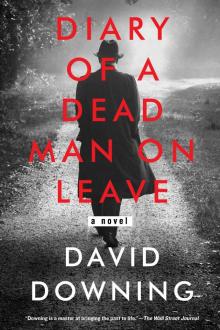 Diary of a Dead Man on Leave
Diary of a Dead Man on Leave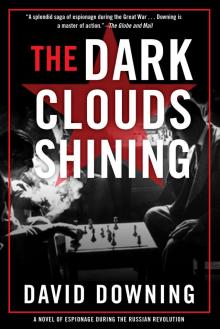 The Dark Clouds Shining
The Dark Clouds Shining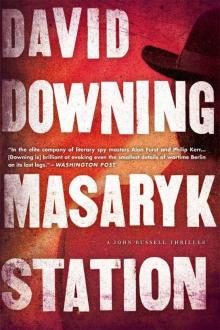 Masaryk Station (John Russell)
Masaryk Station (John Russell)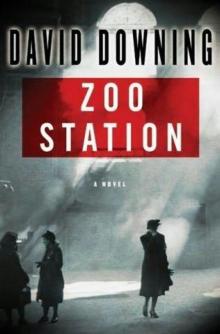 Zoo Stationee
Zoo Stationee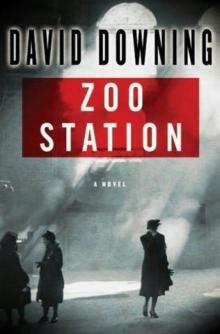 Zoo Station jr-1
Zoo Station jr-1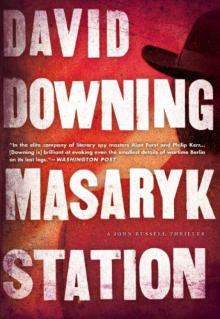 Masaryk Station
Masaryk Station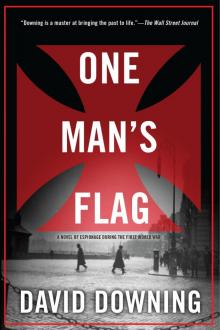 One Man's Flag
One Man's Flag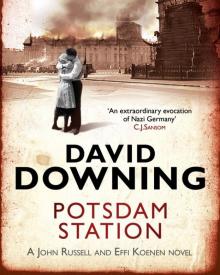 Potsdam Station jr-4
Potsdam Station jr-4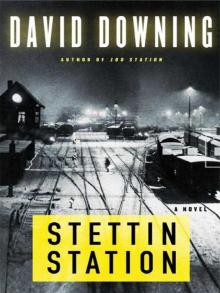 Stattin Station jr-3
Stattin Station jr-3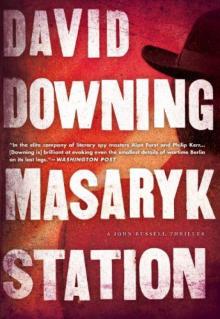 Masaryk Station jr-6
Masaryk Station jr-6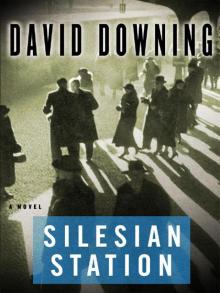 Silesian Station (2008) jr-2
Silesian Station (2008) jr-2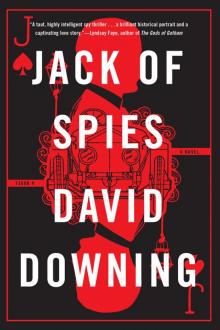 Jack of Spies
Jack of Spies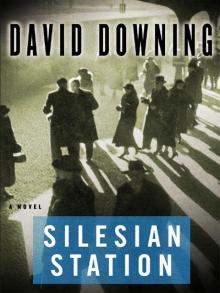 Silesian Station (2008)
Silesian Station (2008) The Moscow Option
The Moscow Option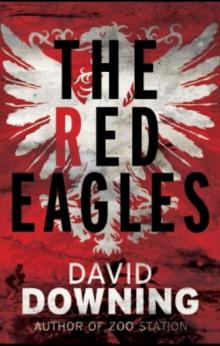 The Red Eagles
The Red Eagles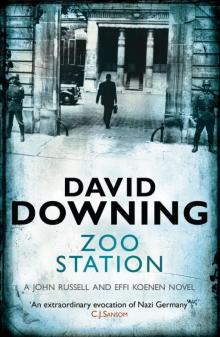 Zoo Station
Zoo Station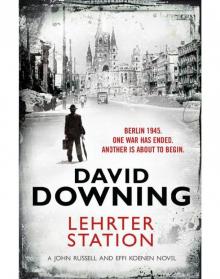 Lehrter Station
Lehrter Station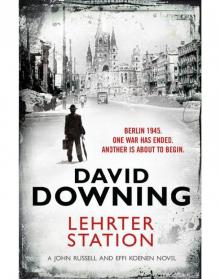 Lehrter Station jr-5
Lehrter Station jr-5